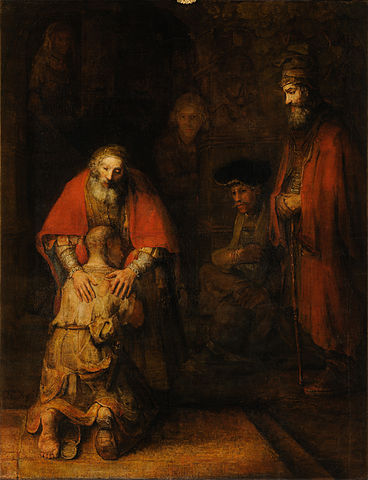Day 21 : 20 March
Hear our voice, O Lord, according to your faithful love.
Lectionary readings (Click the links to see the readings):
| Hosea 14.2-10 | Psalm 81.6-10 | Mark 12.28-34 |

Rembrandt van Rijn, The Return of the Prodigal Son, c. 1661–69. Hermitage Museum, Saint Petersburg.
We all know ourselves to be the Prodigal Son, and we are on that journey. We are at different places on the journey but there is a significant moment on the journey—a moment of epiphany. An epiphany is an important moment in our lives. It is the moment when we finally see. […] Why is the Epiphany such a great feast? It is the feast of the experience, the manifestation of the wondrous mystery that God actually became human. God sent his Son to save us. God the Father sacrificed his supreme Son—his perfect Son—to save us poor, stupid, sinful sons and daughters. It is when we have that epiphany—when we come to really know by divine manifestation what the reality is-then truly do we live.
The Prodigal Son returning home had his whole plan of how this was going to work out. It looked like a beautiful and a good plan. I am going to go and prostrate before my father. I am going to kiss his feet, and I am going to say, "Father, I'm not worthy to be your son. Make me a hired servant. I'll work for you the rest of my life!" He had to completely give up his own plan and accept the father's plan.
That story, as Jesus told it, was absolutely shocking to his hearers. It was a patriarchal society. The father was it! He had power of life and death over all his children and over all his servants. He was the one whom people did come to and kiss his feet. … It was the patriarchal society. The idea of a father picking up his robe, running out and embracing this smelly little brat who had betrayed him and threw away his heritage was just absolutely incomprehensible to these people.
What that Prodigal Son had to accept at that moment was to drop his own plan completely and accept the father's embrace of love. Accept the father's way. Let the father clothe him in the new garment—the garment we receive when we receive the habit. Put on his finger a ring, a pledge of a relationship as deep as the marital relation. Celebrate him! Kill the fatted calf!
I would venture to say that this is precisely that deep struggle each one of us is having. To be able to move out of our own plan and our own self-identity—a false self, even though it is a self that has a lot of truth in it—and see ourselves as poor, weak, stupid sinners. Being able to step out of that and accept the reality of who we are: the beloved son of God who is love beyond anything we can comprehend. And let God celebrate us! We all struggle with that. The only way we are going to make the break-through is when we have the experience—which we only have in contemplative prayer—when we experience God actually saying to us, "This is my son, my beloved, in whom I am well pleased" (cf. Mt. 17.25) When we have that experience, then we are completely freed and can know ourselves as the beloved children of God!
Continued by tomorrow's reading …
W. A. Mozart. Requiem Mass in D Minor. XI - Agnus Dei
English Baroque Soloists and the Monteverdi Choir, cond. John Eliot Gardiner at Palau de la Musica Catalana, Barcelona, Dec. 1991.
| Agnus Dei, qui tollis peccata mundi, dona eis requiem. Agnus Dei, qui tollis peccata mundi, dona eis requiem. Agnus Dei, qui tollis peccata mundi, dona eis requiem sempiternam. | Lamb of God, who takes away the sins of the world, grant them eternal rest. Lamb of God, who takes away the sins of the world, Grant them eternal rest. Lamb of God, who takes away the sins of the world, grant them eternal rest forever. |
May God our Redeemer show us compassion and love. Amen.